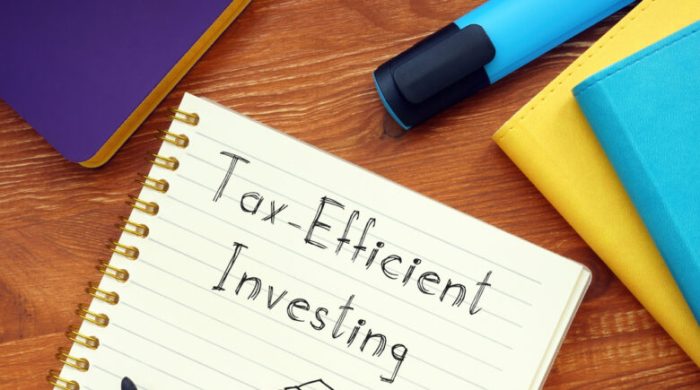Get ready to dive into the world of Tax-efficient investing, where savvy investors make their money work smarter, not harder. From maximizing returns to minimizing taxes, this topic is all about helping you level up your investing game.
Importance of Tax-Efficient Investing
When it comes to investing, tax-efficient strategies can play a crucial role in maximizing returns and optimizing your overall investment portfolio. By understanding and implementing tax-efficient investing practices, you can potentially reduce your tax liability and keep more of your hard-earned money working for you.
Explaining Tax-Efficient Investing
Tax-efficient investing involves strategically managing your investments to minimize the impact of taxes on your returns. This can be achieved by utilizing tax-advantaged accounts, such as IRAs and 401(k)s, and choosing investments that are more tax-efficient, such as index funds or municipal bonds.
Benefits of Tax-Efficient Investing
- Lower Tax Liability: By implementing tax-efficient strategies, you can potentially reduce the amount of taxes you owe on your investment gains.
- Increased Returns: With lower taxes eating into your gains, you can keep more of your investment profits, leading to higher overall returns.
- Long-Term Wealth Growth: Over time, the compounding effect of tax-efficient investing can significantly boost your wealth accumulation and help you achieve your financial goals faster.
Maximizing Returns with Tax-Efficient Investing
By minimizing taxes on your investment gains, you can effectively increase your after-tax returns. This means more money stays invested and has the potential to grow over time. Additionally, reinvesting tax savings can further enhance your wealth-building efforts and accelerate your path to financial independence.
Strategies for Tax-Efficient Investing
When it comes to tax-efficient investing, there are several strategies that can help minimize tax liabilities and maximize returns. Let’s explore some of these strategies below.
Asset Location and Tax Efficiency
Asset location refers to the placement of different types of investments in various types of accounts to optimize tax efficiency. For example, placing tax-efficient investments like index funds or ETFs in taxable accounts and tax-inefficient investments like bonds or actively managed funds in tax-advantaged accounts can help reduce tax burdens. By strategically allocating assets based on their tax implications, investors can potentially improve after-tax returns.
Tax-Loss Harvesting
Tax-loss harvesting involves selling investments that have experienced a loss to offset capital gains and reduce taxable income. This strategy allows investors to use investment losses to their advantage by minimizing taxes owed on gains. By strategically realizing losses and gains, investors can maintain a diversified portfolio while also benefiting from tax savings over the long term.
Tax-Efficient Investment Vehicles

Investing in tax-efficient vehicles is crucial for maximizing your investment returns while minimizing tax liabilities. Let’s explore some options that can help you achieve this goal.
Index Funds and ETFs
Index funds and Exchange-Traded Funds (ETFs) are popular tax-efficient investment options for passive investors. These funds typically have lower turnover rates compared to actively managed funds, which means fewer capital gains distributions. This can result in lower tax liabilities for investors. Additionally, index funds and ETFs often have lower expense ratios, further improving overall returns.
Stocks vs. Bonds
When considering the tax implications of investing in stocks versus bonds, it’s essential to understand that dividends from stocks are typically taxed at a higher rate than interest income from bonds. Capital gains from selling stocks are also subject to capital gains tax, which can vary based on how long you held the investment. On the other hand, interest income from bonds is taxed as ordinary income. Depending on your investment goals and tax situation, you may choose to allocate your investments in a way that minimizes your tax burden.
Retirement Accounts for Tax-Efficient Investing
Retirement accounts such as 401(k)s, Traditional IRAs, and Roth IRAs offer tax advantages that can help you grow your investments more efficiently. Contributions to Traditional IRAs and 401(k)s are typically tax-deductible, reducing your taxable income in the year of contribution. This can result in immediate tax savings. Roth IRAs, while not offering immediate tax benefits, allow for tax-free growth and withdrawals in retirement. By utilizing these retirement accounts strategically, you can optimize your tax efficiency and build a more secure financial future.
Considerations for Tax-Efficient Investing
When it comes to tax-efficient investing, there are several key considerations to keep in mind to minimize taxes on investment gains and optimize your portfolio for tax efficiency.
Minimizing Taxes on Investment Gains
One way to minimize taxes on investment gains is to hold investments for the long term. By holding investments for over a year, you may qualify for lower long-term capital gains tax rates, which can help reduce the amount of taxes you owe on your gains.
Impact of Dividends and Capital Gains on Taxes
Dividends and capital gains are both taxable, but they are taxed differently. Dividends are typically taxed at ordinary income tax rates, while capital gains can be subject to either short-term or long-term capital gains tax rates. Understanding how these types of income are taxed can help you make informed decisions to minimize your tax liability.
Optimizing a Portfolio for Tax Efficiency
One way to optimize your portfolio for tax efficiency is to consider investing in tax-efficient investment vehicles, such as index funds or exchange-traded funds (ETFs). These types of investments often have lower turnover rates, which can help reduce the amount of capital gains distributions that are taxed to you.
